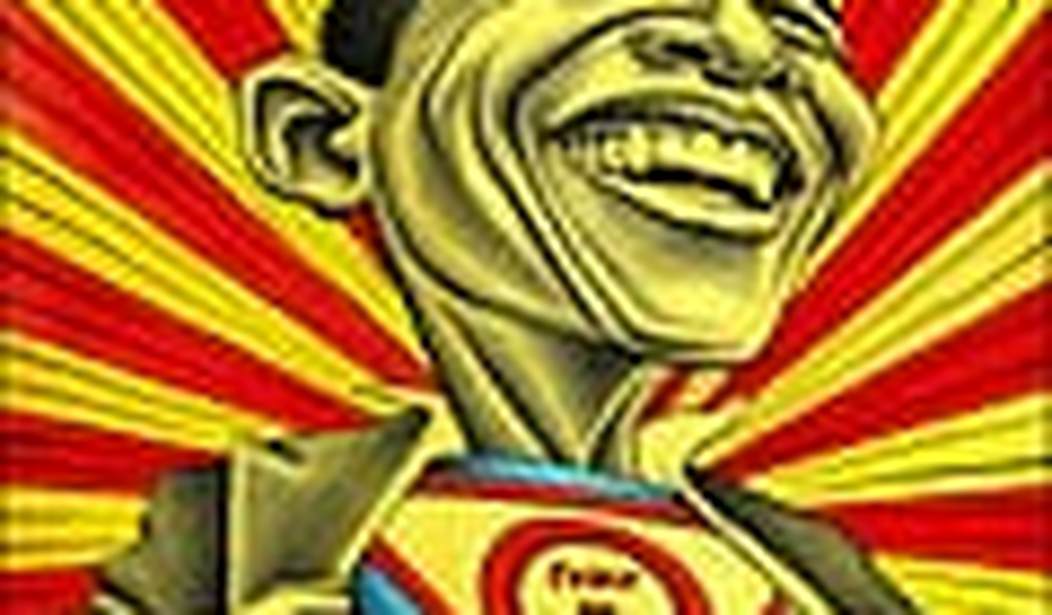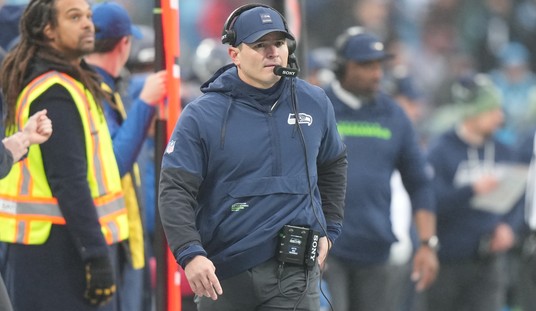I have always been an admirer of David Axelrod — since I found out who he was. His creation of the Obama myth is one of the most impressive marketing and propaganda feats in history, carefully crafted from a simple set of rules and masterfully applied to challenging, shifting circumstances.
Axelrod knew just what he was doing. He created an African American candidate without the ghetto rap. He created an ultimate urban intellectual alternative to George W. Bush — a veritable anti-Bush. He created a pseudo-legend based upon a semi-fictional autobiography.
He created a quasi-evangelical being with the gift to heal the earth.
To create this myth, the Axelrod team had to suppress the dark pages of Obama’s life. Obama’s ideological convictions were simply too far off center, too much the result of a radical leftist ideology.
Obama was a lifelong student of Marxist and neo-Marxist thinkers, his life dedicated to a theoretic approach based on the “historical” conflict of opposing classes. Long before he received the Axelrod touch, Obama was planning the long march through the institutions as a student. He has been as much a brilliant strategist and tactician as Axelrod. He has known when to lay low, and when to attack; when to aggrandize, and when to diminish.
When Obama started to realize that a path to the White House could be opened, he knew he had a problem. As a student he created a trail of radical papers which could be catastrophic to his career. But he was lucky, and able, to hide them in time.
We don’t know what he wrote in his papers at Columbia and Harvard, but we do know they had to vanish. How unsettling did they have to be for that to be necessary? An infamous video of Obama speaking at the farewell party of a Palestinian activist sits in a safe belonging to the the Los Angeles Times, hidden from view by friendly media. Do you suppose it contains images that could harm the myth?
We have no knowledge of what interesting essays, knowledgeable articles, or surprising op-ed pieces he wrote. He has the aura of a sharp intellectual, but there is no proof of it, apart from his doctored autobiographies. He didn’t write op-eds out of a lack of ideas. He had ideas. But when he became a state senator, he realized there was more to gain. Radical ideas and radical speeches could be obstacles.
America is in a deep crisis, both internally and externally. But its most serious crisis is rooted in the continuous process of legitimating the American experiment as defined by its founding fathers. This is a uniquely American process. It seems as if every American president has to define America’s existence from the bottom up. In Obama’s case, he is trying to redefine America’s existence.
It’s his goal to transform the nation into a European welfare state, which he can only execute when he can work around America’s original ideas as formulated by the founding fathers. The almost boundless liberty of free citizens, he believes, should be limited by a strong federal state which demands a sizeable part of the fruits of the labor of its citizens. Obama is enforcing laws and introducing institutions derived from European socialist concepts of “social justice” — which should be, according to progressive thinking, society’s lodestar.
The state, a benign organism in this vision, can only cover the basic needs of its population if it regulates the free market and free enterprise. The obligation to lead a decent, healthy, prosperous life isn’t just the duty or the free choice of its citizenry but the obligation of the state. Only the state can lead the population toward the right economic and moral choices (as formulated by its leaders). In societies centered around the concept of social justice, the cultural and ideological elites tend to be authoritarian. They have an advanced consciousness of the rights and wrongs in the world, and they will show the way.
In the meantime, of course, they will lead luxurious lives while preaching their program of modesty for the masses. (The hypocrisy of progressives such as Gore and Soros and Michael Moore, and progressive dynasties like the Kennedys, is breathtaking).
Economic factors create and change cultures. They transform the way individuals consider their contribution to society, they modify the relation between citizen and state, and they change the way individuals are able to control their own future. But there are limits. The European welfare state, as we know, had to retreat from its program of full control — not only because it is so expensive to maintain (an army can hardly be financed) but because the European welfare state’s defining “narrative” is itself pacifist, introverted, culturally relativist. It is the cultural and ethical side of the welfare state.
And without a doubt, it is the long-term vision of president Obama. His economic transformation will enforce a cultural and ideological transformation. Everything he is doing is driven by this vision. It is postmodern revolutionary socialist methodology at work.
His career is proof that Barack Obama can plan far ahead. He has a superior intellect. He is controlled and disciplined. At the same time, he can behave quite bizarrely, at least according to his critics. What drove him to give a speech in Cairo at the very beginning of his presidency? Why did he greet the Saudi king and Chinese leaders as a servant? Why did he appease anti-American forces while neglecting American allies? Why did he create a literary autobiography while at the same time hiding key facts of his biography? Why is he burdening the U.S. with a debt that will take generations to repay? Why is he fighting Arizona’s policing laws while declining to enforce the borders?
I often read articles claiming Obama isn’t up to his task. He doesn’t understand economics. He isn’t as smart as he claims to be. He’s only talk. He’s lazy.
His critics are wrong.
I started to understand the fascinating phenomenon of Barack Obama when it suddenly dawned upon me that his present office may not be his final ambition.
The individuals in Chicago, with whom he has long fashioned his political identity, as well as the individuals he keeps close to him as advisors in the White House, are mainly leftist ideologues who have embraced the long march through the institutions. Through Obama and his half-fictional character, they have been unbelievably successful, reaching the pinnacle of American political power.
Obama and his team try to transform America and reorganize society around the concept of social justice. A transformed America will, naturally, lead to a completely different balance of power in the world. Internal change will create external change. The vacuum left behind by a weakened U.S. — a world without a superpower, a globe of equal nations — should be filled by a new transnational body. This is the core dream of every progressive ideologue.
World governments or governances have been part of the Marxist curriculum for decades, driven by anti-colonialist, anti-imperialist, and anti-capitalist ideologies. At the moment, the driving forces are earthism, enviromentalism, and fear of manmade global warming. (From the ideologue’s perspective, planetary incineration is the ultimate consequence of imperialist capitalism.) The future of the globe and the human race is at stake — and in order to suppress global warming, the world needs special taxes and special tools to regulate industries and modify human behavior. Who will control these new controlling mechanisms?
The first report of the Club of Rome, published in 1972, introduced to the world the perceived apocalyptic consequences of human activities and human reproduction, and the need to create regulating and controlling political mechanisms. Since then, progressive movements have been trying to implement these mechanisms, like cap and trade or a global tax.
Does Obama, in word and deed, start to make sense when one starts to understand that he sees his role from a vantage point far above the presidency? Beyond the White House, there is a world for him to gain. What he achieved in Washington he could repeat on a global scale.
But he has to walk a fine line: he can neither ruin America nor restore America’s full power and prosperity. He seems to dream of an American sort of European Union — safe, pleasant, but also powerless, lacking the passionate soul of a true nation, slowly fading out with graying populations in unbearably costly welfare states, depending ever more on non-Western immigrants steadily changing our cultural fabric.
In order to save the world from devastating global warming and climate change — and, indeed, all fatal consequences of capitalism — the restless progressives in the world are uniting. Obama is well prepared to position himself as their prophet — or messiah.
Internationalism, global governance, America the evil — these are ideas Obama has absorbed for year after year. As a smart, suave man, he knew exactly what he was doing when he started to climb the ladder. Capitalizing — if I may use the word — on his luck, Obama had the intuition to pick capable operators for his campaigning and policymaking teams.
His conservative critics dramatically underestimate him. Obama knows precisely what kind of America he envisions. He wants to mold a certain type of America in order to mold a certain type of global governance. For that, he needs another term to reach his goal.
In 2016, he will move on to higher office.
Regular politicians don’t have the emotional and intellectual tools to pursue such a strategy. But Obama? Whose explosive rise, ability to manipulate his own biography, and ties to obedient media are staggering? This is a man who wrote not one but two autobiographies and remains an enigma. When you have this capacity, you are really mythical.
After G. W. “what you see is what you get” Bush, America is lead by a president whose deepest convictions remain unfathomable — until, that is, you start to get the idea of a person who considers his stay at the White House as a phase on a longer path.
I may, of course be wrong. I can’t rule that out. After all, if I were, we’d all be better off.









Join the conversation as a VIP Member